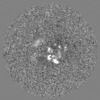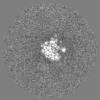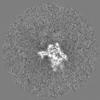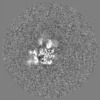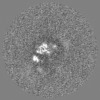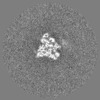[English] 日本語
 Yorodumi
Yorodumi- EMDB-9701: Cryo-EM structure of the CMV-stalled human 80S ribosome (Structure ii) -
+ Open data
Open data
- Basic information
Basic information
| Entry | Database: EMDB / ID: EMD-9701 | |||||||||
|---|---|---|---|---|---|---|---|---|---|---|
| Title | Cryo-EM structure of the CMV-stalled human 80S ribosome (Structure ii) | |||||||||
 Map data Map data | ||||||||||
 Sample Sample |
| |||||||||
 Keywords Keywords | Ribosome / Translation | |||||||||
| Function / homology |  Function and homology information Function and homology informationtranslation at presynapse / exit from mitosis / optic nerve development / response to insecticide / eukaryotic 80S initiation complex / negative regulation of protein neddylation / regulation of translation involved in cellular response to UV / axial mesoderm development / negative regulation of formation of translation preinitiation complex / regulation of G1 to G0 transition ...translation at presynapse / exit from mitosis / optic nerve development / response to insecticide / eukaryotic 80S initiation complex / negative regulation of protein neddylation / regulation of translation involved in cellular response to UV / axial mesoderm development / negative regulation of formation of translation preinitiation complex / regulation of G1 to G0 transition / retinal ganglion cell axon guidance / oxidized pyrimidine DNA binding / response to TNF agonist / negative regulation of endoplasmic reticulum unfolded protein response / positive regulation of base-excision repair / ribosomal protein import into nucleus / protein-DNA complex disassembly / positive regulation of respiratory burst involved in inflammatory response / positive regulation of intrinsic apoptotic signaling pathway in response to DNA damage by p53 class mediator / positive regulation of intrinsic apoptotic signaling pathway in response to DNA damage / positive regulation of gastrulation / 90S preribosome assembly / protein tyrosine kinase inhibitor activity / positive regulation of endodeoxyribonuclease activity / nucleolus organization / IRE1-RACK1-PP2A complex / positive regulation of Golgi to plasma membrane protein transport / TNFR1-mediated ceramide production / alpha-beta T cell differentiation / negative regulation of DNA repair / negative regulation of RNA splicing / GAIT complex / positive regulation of DNA damage response, signal transduction by p53 class mediator / TORC2 complex binding / G1 to G0 transition / supercoiled DNA binding / NF-kappaB complex / neural crest cell differentiation / oxidized purine DNA binding / cysteine-type endopeptidase activator activity involved in apoptotic process / middle ear morphogenesis / positive regulation of ubiquitin-protein transferase activity / negative regulation of intrinsic apoptotic signaling pathway in response to hydrogen peroxide / negative regulation of bicellular tight junction assembly / regulation of establishment of cell polarity / ubiquitin-like protein conjugating enzyme binding / rRNA modification in the nucleus and cytosol / negative regulation of phagocytosis / erythrocyte homeostasis / Formation of the ternary complex, and subsequently, the 43S complex / cytoplasmic side of rough endoplasmic reticulum membrane / negative regulation of ubiquitin protein ligase activity / protein kinase A binding / laminin receptor activity / homeostatic process / ion channel inhibitor activity / Ribosomal scanning and start codon recognition / pigmentation / Translation initiation complex formation / positive regulation of mitochondrial depolarization / macrophage chemotaxis / lung morphogenesis / positive regulation of T cell receptor signaling pathway / fibroblast growth factor binding / negative regulation of Wnt signaling pathway / positive regulation of natural killer cell proliferation / male meiosis I / monocyte chemotaxis / TOR signaling / negative regulation of translational frameshifting / BH3 domain binding / positive regulation of activated T cell proliferation / Protein hydroxylation / SARS-CoV-1 modulates host translation machinery / iron-sulfur cluster binding / regulation of adenylate cyclase-activating G protein-coupled receptor signaling pathway / regulation of cell division / cellular response to ethanol / mTORC1-mediated signalling / Peptide chain elongation / Selenocysteine synthesis / Formation of a pool of free 40S subunits / positive regulation of intrinsic apoptotic signaling pathway by p53 class mediator / cellular response to actinomycin D / endonucleolytic cleavage to generate mature 3'-end of SSU-rRNA from (SSU-rRNA, 5.8S rRNA, LSU-rRNA) / Eukaryotic Translation Termination / blastocyst development / positive regulation of GTPase activity / negative regulation of ubiquitin-dependent protein catabolic process / protein serine/threonine kinase inhibitor activity / SRP-dependent cotranslational protein targeting to membrane / Response of EIF2AK4 (GCN2) to amino acid deficiency / ubiquitin ligase inhibitor activity / Viral mRNA Translation / negative regulation of respiratory burst involved in inflammatory response / positive regulation of signal transduction by p53 class mediator / protein localization to nucleus / Nonsense Mediated Decay (NMD) independent of the Exon Junction Complex (EJC) / GTP hydrolysis and joining of the 60S ribosomal subunit / L13a-mediated translational silencing of Ceruloplasmin expression Similarity search - Function | |||||||||
| Biological species |  Homo sapiens (human) Homo sapiens (human) | |||||||||
| Method | single particle reconstruction / cryo EM / Resolution: 3.9 Å | |||||||||
 Authors Authors | Yokoyama T / Shigematsu H / Shirouzu M / Imataka H / Ito T | |||||||||
| Funding support |  Japan, 1 items Japan, 1 items
| |||||||||
 Citation Citation |  Journal: Mol Cell / Year: 2019 Journal: Mol Cell / Year: 2019Title: HCV IRES Captures an Actively Translating 80S Ribosome. Authors: Takeshi Yokoyama / Kodai Machida / Wakana Iwasaki / Tomoaki Shigeta / Madoka Nishimoto / Mari Takahashi / Ayako Sakamoto / Mayumi Yonemochi / Yoshie Harada / Hideki Shigematsu / Mikako ...Authors: Takeshi Yokoyama / Kodai Machida / Wakana Iwasaki / Tomoaki Shigeta / Madoka Nishimoto / Mari Takahashi / Ayako Sakamoto / Mayumi Yonemochi / Yoshie Harada / Hideki Shigematsu / Mikako Shirouzu / Hisashi Tadakuma / Hiroaki Imataka / Takuhiro Ito /  Abstract: Translation initiation of hepatitis C virus (HCV) genomic RNA is induced by an internal ribosome entry site (IRES). Our cryoelectron microscopy (cryo-EM) analysis revealed that the HCV IRES binds to ...Translation initiation of hepatitis C virus (HCV) genomic RNA is induced by an internal ribosome entry site (IRES). Our cryoelectron microscopy (cryo-EM) analysis revealed that the HCV IRES binds to the solvent side of the 40S platform of the cap-dependently translating 80S ribosome. Furthermore, we obtained the cryo-EM structures of the HCV IRES capturing the 40S subunit of the IRES-dependently translating 80S ribosome. In the elucidated structures, the HCV IRES "body," consisting of domain III except for subdomain IIIb, binds to the 40S subunit, while the "long arm," consisting of domain II, remains flexible and does not impede the ongoing translation. Biochemical experiments revealed that the cap-dependently translating ribosome becomes a better substrate for the HCV IRES than the free ribosome. Therefore, the HCV IRES is likely to efficiently induce the translation initiation of its downstream mRNA with the captured translating ribosome as soon as the ongoing translation terminates. | |||||||||
| History |
|
- Structure visualization
Structure visualization
| Movie |
 Movie viewer Movie viewer |
|---|---|
| Structure viewer | EM map:  SurfView SurfView Molmil Molmil Jmol/JSmol Jmol/JSmol |
| Supplemental images |
- Downloads & links
Downloads & links
-EMDB archive
| Map data |  emd_9701.map.gz emd_9701.map.gz | 260.4 MB |  EMDB map data format EMDB map data format | |
|---|---|---|---|---|
| Header (meta data) |  emd-9701-v30.xml emd-9701-v30.xml emd-9701.xml emd-9701.xml | 98.5 KB 98.5 KB | Display Display |  EMDB header EMDB header |
| FSC (resolution estimation) |  emd_9701_fsc.xml emd_9701_fsc.xml | 14.8 KB | Display |  FSC data file FSC data file |
| Images |  emd_9701.png emd_9701.png | 153 KB | ||
| Filedesc metadata |  emd-9701.cif.gz emd-9701.cif.gz | 19.7 KB | ||
| Archive directory |  http://ftp.pdbj.org/pub/emdb/structures/EMD-9701 http://ftp.pdbj.org/pub/emdb/structures/EMD-9701 ftp://ftp.pdbj.org/pub/emdb/structures/EMD-9701 ftp://ftp.pdbj.org/pub/emdb/structures/EMD-9701 | HTTPS FTP |
-Related structure data
| Related structure data |  6ip5MC  9699C  9702C  9703C  9704C  6ip6C  6ip8C C: citing same article ( M: atomic model generated by this map |
|---|---|
| Similar structure data |
- Links
Links
| EMDB pages |  EMDB (EBI/PDBe) / EMDB (EBI/PDBe) /  EMDataResource EMDataResource |
|---|---|
| Related items in Molecule of the Month |
- Map
Map
| File |  Download / File: emd_9701.map.gz / Format: CCP4 / Size: 282.6 MB / Type: IMAGE STORED AS FLOATING POINT NUMBER (4 BYTES) Download / File: emd_9701.map.gz / Format: CCP4 / Size: 282.6 MB / Type: IMAGE STORED AS FLOATING POINT NUMBER (4 BYTES) | ||||||||||||||||||||||||||||||||||||||||||||||||||||||||||||||||||||
|---|---|---|---|---|---|---|---|---|---|---|---|---|---|---|---|---|---|---|---|---|---|---|---|---|---|---|---|---|---|---|---|---|---|---|---|---|---|---|---|---|---|---|---|---|---|---|---|---|---|---|---|---|---|---|---|---|---|---|---|---|---|---|---|---|---|---|---|---|---|
| Projections & slices | Image control
Images are generated by Spider. | ||||||||||||||||||||||||||||||||||||||||||||||||||||||||||||||||||||
| Voxel size | X=Y=Z: 1.49 Å | ||||||||||||||||||||||||||||||||||||||||||||||||||||||||||||||||||||
| Density |
| ||||||||||||||||||||||||||||||||||||||||||||||||||||||||||||||||||||
| Symmetry | Space group: 1 | ||||||||||||||||||||||||||||||||||||||||||||||||||||||||||||||||||||
| Details | EMDB XML:
CCP4 map header:
| ||||||||||||||||||||||||||||||||||||||||||||||||||||||||||||||||||||
-Supplemental data
- Sample components
Sample components
+Entire : Human 80S ribosome
+Supramolecule #1: Human 80S ribosome
+Macromolecule #1: 28S ribosomal RNA
+Macromolecule #2: 5S ribosomal RNA
+Macromolecule #3: 5.8S ribosomal RNA
+Macromolecule #47: 18S ribosomal RNA
+Macromolecule #81: mRNA
+Macromolecule #83: P-site tRNA
+Macromolecule #4: 60S ribosomal protein L8
+Macromolecule #5: 60S ribosomal protein L3
+Macromolecule #6: 60S ribosomal protein L4
+Macromolecule #7: 60S ribosomal protein L5
+Macromolecule #8: 60S ribosomal protein L6
+Macromolecule #9: 60S ribosomal protein L7
+Macromolecule #10: 60S ribosomal protein L7a
+Macromolecule #11: 60S ribosomal protein L9
+Macromolecule #12: 60S ribosomal protein L10-like
+Macromolecule #13: 60S ribosomal protein L11
+Macromolecule #14: 60S ribosomal protein L13
+Macromolecule #15: 60S ribosomal protein L14
+Macromolecule #16: 60S ribosomal protein L15
+Macromolecule #17: 60S ribosomal protein L13a
+Macromolecule #18: 60S ribosomal protein L17
+Macromolecule #19: 60S ribosomal protein L18
+Macromolecule #20: 60S ribosomal protein L19
+Macromolecule #21: 60S ribosomal protein L18a
+Macromolecule #22: 60S ribosomal protein L21
+Macromolecule #23: 60S ribosomal protein L22
+Macromolecule #24: 60S ribosomal protein L23
+Macromolecule #25: 60S ribosomal protein L24
+Macromolecule #26: 60S ribosomal protein L23a
+Macromolecule #27: 60S ribosomal protein L26
+Macromolecule #28: 60S ribosomal protein L27
+Macromolecule #29: 60S ribosomal protein L27a
+Macromolecule #30: 60S ribosomal protein L29
+Macromolecule #31: 60S ribosomal protein L30
+Macromolecule #32: 60S ribosomal protein L31
+Macromolecule #33: 60S ribosomal protein L32
+Macromolecule #34: 60S ribosomal protein L35a
+Macromolecule #35: 60S ribosomal protein L34
+Macromolecule #36: 60S ribosomal protein L35
+Macromolecule #37: 60S ribosomal protein L36
+Macromolecule #38: 60S ribosomal protein L37
+Macromolecule #39: 60S ribosomal protein L38
+Macromolecule #40: 60S ribosomal protein L39
+Macromolecule #41: Ubiquitin-60S ribosomal protein L40
+Macromolecule #42: 60S ribosomal protein L41
+Macromolecule #43: 60S ribosomal protein L36a
+Macromolecule #44: 60S ribosomal protein L37a
+Macromolecule #45: 60S ribosomal protein L28
+Macromolecule #46: 60S ribosomal protein L10a
+Macromolecule #48: 40S ribosomal protein SA
+Macromolecule #49: 40S ribosomal protein S3a
+Macromolecule #50: 40S ribosomal protein S3
+Macromolecule #51: 40S ribosomal protein S4, X isoform
+Macromolecule #52: 40S ribosomal protein S5
+Macromolecule #53: 40S ribosomal protein S7
+Macromolecule #54: 40S ribosomal protein S8
+Macromolecule #55: 40S ribosomal protein S10
+Macromolecule #56: 40S ribosomal protein S11
+Macromolecule #57: 40S ribosomal protein S15
+Macromolecule #58: 40S ribosomal protein S16
+Macromolecule #59: 40S ribosomal protein S17
+Macromolecule #60: 40S ribosomal protein S18
+Macromolecule #61: 40S ribosomal protein S19
+Macromolecule #62: 40S ribosomal protein S20
+Macromolecule #63: 40S ribosomal protein S21
+Macromolecule #64: 40S ribosomal protein S23
+Macromolecule #65: 40S ribosomal protein S26
+Macromolecule #66: 40S ribosomal protein S28
+Macromolecule #67: 40S ribosomal protein S29
+Macromolecule #68: Receptor of activated protein C kinase 1
+Macromolecule #69: 40S ribosomal protein S2
+Macromolecule #70: 40S ribosomal protein S6
+Macromolecule #71: 40S ribosomal protein S9
+Macromolecule #72: 40S ribosomal protein S12
+Macromolecule #73: 40S ribosomal protein S13
+Macromolecule #74: 40S ribosomal protein S14
+Macromolecule #75: 40S ribosomal protein S15a
+Macromolecule #76: 40S ribosomal protein S24
+Macromolecule #77: 40S ribosomal protein S25
+Macromolecule #78: 40S ribosomal protein S27
+Macromolecule #79: 40S ribosomal protein S30
+Macromolecule #80: Ubiquitin-40S ribosomal protein S27a
+Macromolecule #82: nascent peptide
-Experimental details
-Structure determination
| Method | cryo EM |
|---|---|
 Processing Processing | single particle reconstruction |
| Aggregation state | particle |
- Sample preparation
Sample preparation
| Buffer | pH: 7.5 |
|---|---|
| Grid | Model: Quantifoil R1.2/1.3 / Material: COPPER / Mesh: 300 / Support film - Material: CARBON / Support film - topology: CONTINUOUS |
| Vitrification | Cryogen name: ETHANE / Chamber humidity: 100 % / Chamber temperature: 277 K / Instrument: FEI VITROBOT MARK IV |
- Electron microscopy
Electron microscopy
| Microscope | FEI TECNAI ARCTICA |
|---|---|
| Image recording | Film or detector model: GATAN K2 SUMMIT (4k x 4k) / Detector mode: SUPER-RESOLUTION / Average electron dose: 50.0 e/Å2 |
| Electron beam | Acceleration voltage: 200 kV / Electron source:  FIELD EMISSION GUN FIELD EMISSION GUN |
| Electron optics | C2 aperture diameter: 50.0 µm / Calibrated magnification: 33557 / Illumination mode: FLOOD BEAM / Imaging mode: BRIGHT FIELD / Cs: 2.7 mm / Nominal magnification: 23500 |
| Sample stage | Cooling holder cryogen: NITROGEN |
| Experimental equipment | 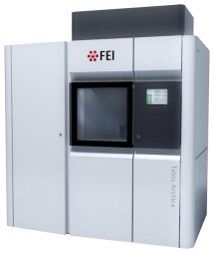 Model: Talos Arctica / Image courtesy: FEI Company |
 Movie
Movie Controller
Controller


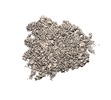








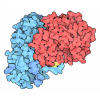

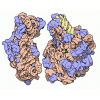
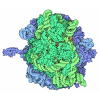

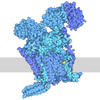
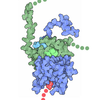


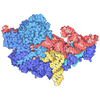


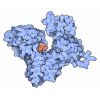

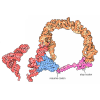






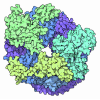




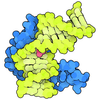



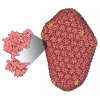
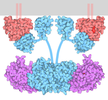

 Z (Sec.)
Z (Sec.) Y (Row.)
Y (Row.) X (Col.)
X (Col.)








